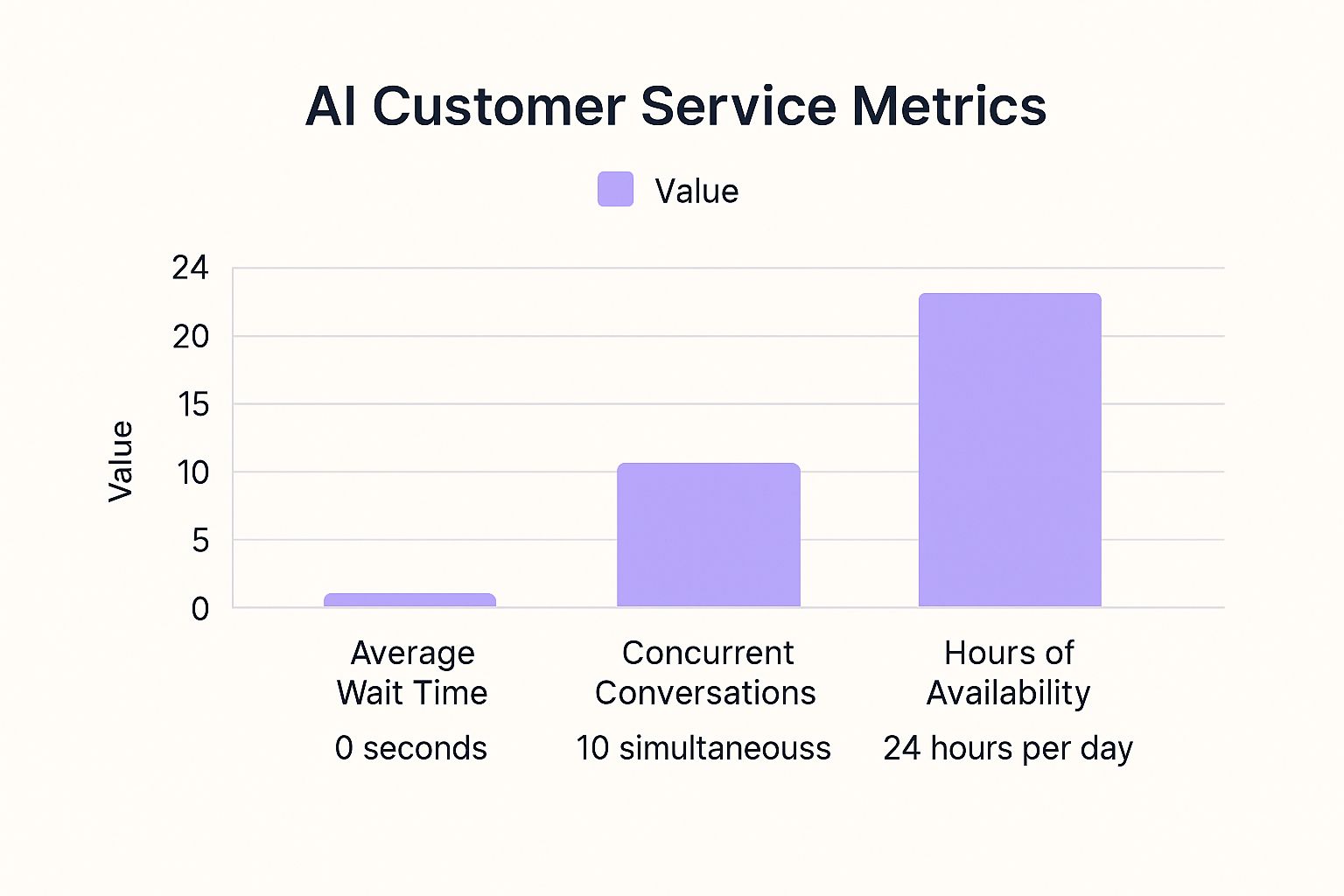Getting Started
Boosting customer satisfaction while streamlining operations is a constant challenge. This curated list explores the key benefits of AI in customer service, offering actionable insights and practical examples to transform your support strategies. Discover how AI can revolutionize your customer interactions, optimize resource allocation, and drive business growth. We'll delve into specific use cases, highlighting how FlowGent AI empowers businesses to achieve these advantages. This information is crucial for businesses of all sizes, from small e-commerce startups to large global enterprises, seeking to enhance their customer service capabilities.
This listicle will equip you with a practical understanding of how AI can:
- Provide 24/7 availability and instant support
- Reduce costs and optimize resource allocation
- Deliver personalized customer experiences
- Offer multilingual support for a global audience
- Ensure consistent service quality and minimize errors
- Provide advanced data analytics and customer insights
- Intelligently route queries and manage escalations
Understanding these benefits of AI in customer service is no longer a luxury, but a necessity for remaining competitive. Whether you manage a small e-commerce store or a global enterprise, the insights provided here will empower you to make informed decisions about integrating AI into your customer service strategies. This listicle avoids vague generalities and instead focuses on specific, actionable strategies you can implement to enhance your customer service operations with the power of AI. Prepare to discover how AI can revolutionize your approach to customer support and unlock new opportunities for your business.
1. 24/7 Availability and Instant Response Times
One of the most significant benefits of AI in customer service is its ability to provide uninterrupted, immediate support. AI-powered systems, unlike human agents, don't need breaks or adhere to traditional business hours. This 24/7 availability translates to instant response times, a crucial factor in today's fast-paced digital world where customers expect immediate assistance. No more waiting on hold or waiting for business hours to begin; AI chatbots and virtual assistants are always ready to handle inquiries. This significantly reduces customer frustration and enhances satisfaction by providing timely support when and where it's needed.
Real-World Examples of 24/7 AI
Several companies have successfully implemented 24/7 AI support. Sephora's chatbot provides personalized product recommendations around the clock. H&M utilizes a virtual assistant to help customers track orders and find products at any hour. Even in the financial sector, Bank of America's virtual assistant, Erica, offers banking support day and night. Domino's Pizza uses AI to manage orders and provide continuous delivery tracking. These examples demonstrate the diverse applications of 24/7 AI support across various industries.
Implementing 24/7 AI Support: Best Practices
- Transparency is key: Clearly communicate the AI's capabilities and limitations to manage customer expectations.
- Human escalation path: Provide an easy way for customers to connect with a human agent for complex or sensitive issues.
- Continuous improvement: Regularly update the AI's knowledge base with new information and FAQs to ensure accurate and comprehensive responses.
- Performance monitoring: Track key metrics like response accuracy and customer satisfaction to identify areas for improvement and optimize the AI's performance.
- Global reach: Implement multilingual support to cater to a diverse customer base and expand your reach globally.
When 24/7 Support is Essential
This approach is invaluable for businesses operating in global markets, handling high volumes of inquiries, or aiming to provide seamless customer experiences. E-commerce businesses, for example, can leverage 24/7 AI support to manage order inquiries and provide instant assistance with shipping and delivery questions, even outside of normal business hours. This ensures consistent customer engagement and builds brand loyalty.
The following infographic visualizes the significant advantages of 24/7 AI support by comparing key customer service metrics. It uses a bar chart to represent 'Average Wait Time', 'Concurrent Conversations', and 'Hours of Availability'.

As the infographic clearly shows, AI-powered systems can drastically reduce wait times to zero, handle multiple (10 or more in our example) conversations simultaneously, and provide uninterrupted support 24/7. This highlights the potential of AI to transform customer service operations and provide significant benefits for both businesses and customers. Leveraging this technology empowers businesses to deliver exceptional customer experiences while optimizing efficiency and reducing costs. This constant availability ensures that customers receive the help they need precisely when they need it, leading to increased satisfaction and loyalty.
2. Significant Cost Reduction and Resource Optimization
Implementing AI in customer service offers a powerful avenue for substantial cost reduction and optimized resource allocation. By automating routine inquiries and tasks, AI reduces the need for large customer service teams. Organizations can then manage increased query volumes without a proportional increase in staff, leading to significant savings in salary, training, and infrastructure costs. This efficiency gain doesn't necessarily compromise service quality; in many cases, it enhances it through faster response times and 24/7 availability.
Real-World Examples of Cost Savings with AI
Several companies have realized significant cost savings through AI-powered customer service. Vodafone, for instance, reduced its customer service costs by a remarkable 68% using AI chatbots. KLM Royal Dutch Airlines has also saved millions through AI-driven customer support solutions. Amtrak's virtual assistant, "Julie," handles an impressive 5 million conversations annually, significantly reducing the workload on human agents. ING Bank implemented an AI assistant that reduced call center volume by 60%, optimizing resource allocation and cutting costs.
Implementing AI for Cost Optimization: Best Practices
- Start small: Begin by automating high-volume, low-complexity queries to see immediate ROI and gain experience.
- Calculate ROI: Measure cost per interaction before and after AI implementation to track cost savings accurately. Learn more about Significant Cost Reduction and Resource Optimization
- Invest wisely: Choose quality AI platforms that minimize the need for frequent system changes and updates.
- Gradual implementation: Implement AI gradually to manage change effectively and ensure a smooth transition for both staff and customers.
- Monitor satisfaction: Continuously track customer satisfaction metrics to confirm cost savings aren't negatively impacting the customer experience.
When AI-Driven Cost Reduction is Most Effective
This approach is especially valuable for businesses experiencing high volumes of repetitive customer inquiries, those looking to extend support hours without increasing staffing costs, and organizations aiming to optimize resource allocation for maximum efficiency. AI-powered solutions can free up human agents to focus on complex issues requiring empathy and critical thinking, leading to a more effective and satisfying customer service experience overall. Companies seeking scalable, sustainable customer service solutions should strongly consider integrating AI to achieve significant cost reduction and optimize resource utilization. This strategic implementation ensures that businesses can provide efficient and effective customer service while simultaneously minimizing operational expenses.
3. Personalized Customer Experiences at Scale
One of the most compelling benefits of AI in customer service is its ability to deliver personalized experiences at scale. AI analyzes vast amounts of customer data, including purchase history, browsing behavior, preferences, and past interactions, to create highly individualized customer service interactions. This technology allows businesses to offer tailored recommendations, customized solutions, and targeted communication, making each customer feel valued and understood. Crucially, AI can achieve this level of personalization while simultaneously serving thousands of customers, a feat impossible for human agents alone.

Real-World Examples of Personalized AI
Many companies are already leveraging AI for personalized customer service. Netflix utilizes AI to provide personalized content recommendations and tailored customer support. Amazon offers personalized product suggestions and customer service based on individual purchase history. Spotify's AI-driven support considers music preferences when addressing customer inquiries. Even Starbucks personalizes offers and resolves issues based on customer behavior. These diverse applications illustrate the power of AI in providing unique experiences across various industries.
Implementing Personalized AI Support: Best Practices
- Transparency and Consent: Ensure transparent data usage policies and obtain proper consent for data collection and personalization.
- Privacy Balance: Balance personalization with privacy to build and maintain customer trust. Avoid overly intrusive personalization tactics.
- Optimized Algorithms: Use A/B testing to refine personalization algorithms and maximize their effectiveness.
- Bias Mitigation: Train AI models on diverse datasets to avoid bias and ensure equitable experiences for all customers.
- Customer Control: Offer customers control over their personalization preferences, allowing them to adjust the level of customization they receive.
For global audiences, enhance your approach with multilingual customer service.
When Personalized Support is Essential
Personalized customer service is particularly valuable for businesses seeking to enhance customer loyalty and drive engagement. By tailoring interactions to individual needs and preferences, companies can foster stronger customer relationships and increase customer lifetime value. This approach is especially impactful in competitive markets where personalized experiences can be a key differentiator. Learn more about Personalized Customer Experiences at Scale by exploring resources like customer journey orchestration.
Personalized AI excels in scenarios involving complex product offerings or services where tailored guidance is crucial. For instance, a financial institution can use AI to provide personalized investment advice based on a customer's financial history and risk tolerance. This targeted approach significantly enhances the customer experience and fosters deeper engagement. This ability to scale personalized interactions makes AI a powerful tool for businesses of all sizes, enabling them to deliver tailored experiences that resonate with individual customers and drive business growth.
4. Multilingual Support and Global Accessibility
One of the most powerful advantages of AI in customer service lies in its ability to transcend language barriers and provide support to a diverse, global customer base. AI-powered systems offer real-time translation and multilingual support, enabling businesses to engage with customers in their native languages. This eliminates the need for separate customer service teams for each language, leading to significant cost savings and ensuring consistent service quality across different languages and cultural contexts. This capability is a game-changer for businesses looking to expand their global reach and cater to a wider audience.

Real-World Examples of Multilingual AI
Several prominent companies leverage AI for multilingual customer service. AirAsia's AI chatbot supports an impressive 12 languages, catering to its diverse passenger base across Asia. Uber uses a multilingual AI assistant to facilitate communication between riders and drivers globally, enhancing user experience and safety. PayPal's AI provides customer support in over 20 languages, facilitating seamless international transactions. Booking.com also utilizes AI to handle customer inquiries in over 40 languages, streamlining the booking process for travelers worldwide. These examples demonstrate the effectiveness of AI in bridging communication gaps and enhancing customer satisfaction in a globalized market. Learn more about Multilingual Support and Global Accessibility.
Implementing Multilingual AI Support: Best Practices
- Prioritize key languages: Start by implementing support for the most common languages spoken by your customer base.
- Human oversight: Maintain human oversight for critical or complex multilingual interactions to ensure accuracy and sensitivity.
- Regular updates: Regularly update language models with regional variations and slang to maintain relevance and accuracy.
- Native speaker testing: Test AI responses with native speakers to ensure accuracy, cultural appropriateness, and natural language flow.
- Escalation paths: Provide clear escalation paths to human multilingual agents when needed for complex or sensitive issues.
When Multilingual Support is Essential
Multilingual AI support is invaluable for businesses operating in international markets, serving diverse customer populations, or aiming to expand their global footprint. E-commerce businesses can use it to personalize the shopping experience for customers in different regions and languages, boosting conversion rates. Travel and hospitality companies can leverage it to provide seamless booking and support experiences for international travelers. In essence, any business aiming to provide exceptional customer service in a globalized world should consider implementing multilingual AI support. This approach not only enhances customer satisfaction but also unlocks new market opportunities and strengthens brand loyalty across borders. By removing language barriers, businesses can connect with customers on a deeper level and foster stronger relationships, leading to increased customer lifetime value and sustainable growth in the global marketplace. This reflects the transformative potential of AI in breaking down communication barriers and creating a truly connected customer experience.
5. Consistent Service Quality and Error Reduction
One of the most compelling benefits of AI in customer service is its ability to deliver consistent service quality and significantly reduce errors. Unlike human agents who can be influenced by factors like mood, fatigue, or individual knowledge gaps, AI-powered systems operate based on pre-defined rules and comprehensive knowledge bases. This ensures every customer receives the same high-quality service experience, regardless of the time of day, communication channel, or the specific agent (virtual or human) they interact with. This consistency builds trust and fosters a positive brand image.
Real-World Examples of Consistent AI Service
Several leading companies leverage AI to maintain consistent service delivery. American Express utilizes AI to ensure cardholders receive uniform service information globally, regardless of their location. FedEx uses AI to provide standardized package tracking and delivery updates, creating a seamless experience for customers. Best Buy leverages AI to deliver consistent product information and recommendations across all its sales channels - online, in-app, and in-store. IKEA's AI-powered assistant offers standardized product assembly guidance, minimizing customer frustration and ensuring a smooth setup process.
Implementing Consistent AI Service: Best Practices
- Regularly audit AI responses: Ensure accuracy and alignment with brand voice and messaging.
- Feedback loops: Implement mechanisms to continuously improve response quality and address any inconsistencies.
- Comprehensive training datasets: Include edge cases and diverse customer inquiries to ensure the AI can handle a wide range of situations.
- Clear escalation procedures: Define clear processes for transferring complex or sensitive issues to human agents.
- Monitor customer satisfaction: Track metrics to gauge the effectiveness of the AI in delivering consistent, high-quality service.
When Consistent Service is Paramount
Consistent service quality is especially crucial for businesses operating in regulated industries, dealing with complex products or services, or aiming to establish a strong brand reputation. This approach benefits companies with a large customer base or those operating across multiple geographies, ensuring a uniform experience for all. For example, financial institutions can utilize AI to provide consistent information about account balances, transaction history, and service fees. This not only streamlines customer interactions but also reduces the risk of errors and misinformation. This predictability builds customer confidence and strengthens brand loyalty. By leveraging AI, businesses can significantly improve the accuracy and consistency of their customer service, leading to greater customer satisfaction and increased operational efficiency. This consistency is a key differentiator in today's competitive market and a crucial element of building long-term customer relationships.
6. Advanced Data Analytics and Customer Insights
One of the most powerful benefits of AI in customer service lies in its ability to unlock deep customer insights through advanced data analytics. AI systems continuously collect, analyze, and interpret massive datasets from customer interactions, providing a comprehensive understanding of customer behavior, preferences, pain points, and overall satisfaction. This granular level of analysis enables companies to make data-driven decisions about product development, service improvements, and strategic planning. AI can also identify emerging trends and hidden patterns that would be impossible for human analysts to detect manually.
Real-World Examples of AI-Powered Customer Insights
Several companies leverage AI analytics to gain a competitive edge. Coca-Cola uses AI to analyze customer preferences across different regions, informing targeted marketing campaigns and product development strategies. Delta Airlines analyzes customer service interactions and feedback to identify areas for improvement in the travel experience. Samsung utilizes AI insights to enhance product support and development, addressing customer needs more effectively. Airbnb leverages AI analytics to improve the quality of host-guest interactions, creating a more personalized and positive experience for both parties.
Implementing AI Analytics: Best Practices
- Define clear KPIs and metrics: Establish specific, measurable, achievable, relevant, and time-bound (SMART) goals for your AI analytics initiatives.
- Ensure data quality: Maintain accurate and consistent data across all collection points to ensure the reliability of insights generated by the AI.
- Actionable dashboards: Create user-friendly dashboards that translate complex data into actionable insights that can inform business decisions.
- Human validation: Regularly validate AI-generated insights with human expertise and market research to ensure accuracy and avoid biases.
- Data governance: Implement robust data governance and privacy protection measures to safeguard customer data and comply with relevant regulations.
When Advanced Analytics are Crucial
AI-powered data analytics is invaluable for companies looking to gain a deeper understanding of their customer base. This approach is especially beneficial for businesses operating in competitive markets, dealing with large volumes of customer data, or seeking to personalize customer experiences. E-commerce companies can use AI analytics to predict purchasing behavior and tailor product recommendations, while SaaS businesses can analyze user engagement patterns to optimize product features and improve customer retention.
This data-driven approach allows businesses to anticipate customer needs, personalize interactions, and proactively address potential issues, ultimately leading to increased customer satisfaction, loyalty, and revenue growth. By leveraging the power of AI analytics, businesses can transform raw data into actionable insights that drive informed decision-making and create exceptional customer experiences. This deeper understanding of the customer journey empowers businesses to anticipate needs, personalize interactions, and ultimately build stronger relationships.
7. Intelligent Query Routing and Escalation Management
One of the most powerful applications of AI in customer service lies in its ability to intelligently route and escalate customer queries. AI systems can analyze incoming inquiries, assess their complexity, urgency, and required expertise, and then automatically direct them to the most appropriate resource. This could be an AI chatbot for simple FAQs, a specific human agent skilled in a particular area, or a specialized team for complex technical issues. This smart routing optimizes resource allocation and drastically reduces resolution times, leading to improved customer satisfaction.
Real-World Examples of Intelligent Routing
Several companies are leveraging AI-powered routing to enhance their customer service operations. Salesforce Einstein analyzes case content and agent expertise to route cases efficiently. Zendesk uses AI to automatically assign tickets to the right support teams based on keywords and context. Microsoft employs AI to direct technical support queries to specialized engineers. Even in the telecommunications sector, T-Mobile uses AI to route billing, technical, and sales inquiries effectively, ensuring customers are connected with the right agent quickly.
Implementing Intelligent Routing: Best Practices
- Map query types: Thoroughly map all possible customer query types and their corresponding routing destinations.
- Train AI models: Continuously train the AI models on successful routing outcomes to improve accuracy and efficiency.
- Feedback mechanisms: Implement feedback mechanisms to allow agents to correct routing errors and further refine the AI's performance.
- Smooth handoffs: Ensure seamless handoff processes between AI bots and human agents to avoid disruptions in the customer experience.
- Monitor and adjust: Regularly monitor routing effectiveness and adjust algorithms as needed to optimize performance.
When Intelligent Routing is Essential
Intelligent routing and escalation management is especially crucial for businesses dealing with high volumes of diverse inquiries, complex product offerings, or specialized support teams. It streamlines workflows, reduces wait times, and ensures that customers receive the right level of support at the right time. This approach is also beneficial for businesses aiming to personalize customer interactions by directing inquiries to agents with relevant expertise.
Companies like Genesys, Avaya, Five9, and Twilio Flex have popularized AI-powered routing solutions, offering robust platforms for intelligent routing and workforce optimization. By leveraging these technologies, businesses can significantly improve their customer service efficiency, reduce costs, and deliver more personalized and effective support experiences. This intelligent routing ensures that customer issues are resolved quickly and efficiently by connecting them with the most qualified resource, leading to increased customer satisfaction and loyalty. This targeted approach minimizes the time customers spend navigating support channels and maximizes the effectiveness of each interaction.
AI Customer Service Benefits: 7-Point Comparison
| Feature / Aspect | 24/7 Availability and Instant Response Times | Significant Cost Reduction and Resource Optimization | Personalized Customer Experiences at Scale | Multilingual Support and Global Accessibility | Consistent Service Quality and Error Reduction | Advanced Data Analytics and Customer Insights | Intelligent Query Routing and Escalation Management |
|---|---|---|---|---|---|---|---|
| Implementation Complexity 🔄 | Moderate - requires robust AI and integration with channels | High - initial setup and ongoing maintenance costly | High - needs complex data collection and modeling | High - requires advanced NLP and cultural adaptation | Moderate - needs detailed knowledge base and quality controls | High - demands sophisticated data management and analytics systems | High - requires deep system integration and dynamic routing algorithms |
| Resource Requirements ⚡ | Low ongoing human resource due to automation | Low human staffing but requires significant AI platform investment | High data and computing resources | Moderate hardware, high language data sets | Moderate AI training and QA resources | High computational power and data specialists | Moderate to high for AI training and integration experts |
| Expected Outcomes 📊 | ⭐⭐ Instant support, 24/7 access, reduced wait times | ⭐⭐ Substantial cost savings and optimized resource allocation | ⭐⭐⭐ Enhanced personalization, increased loyalty and CLV | ⭐⭐ Expanded global reach, language barrier removal | ⭐⭐ Consistent, accurate, and error-free responses | ⭐⭐⭐ Deep insights, predictive analytics, faster decision-making | ⭐⭐⭐ Improved routing efficiency, higher resolution rates |
| Ideal Use Cases 💡 | Customer service centers needing nonstop availability | Organizations aiming to reduce operational costs | Businesses targeting mass personalization and customer retention | Companies with diverse global customer base | Firms needing standardized service quality | Enterprises seeking actionable customer insights | Contact centers with diverse query types and agent specializations |
| Key Advantages ⭐ | Instant replies, no downtime, multi-conversation handling | Lower costs, less human workload, scalable solutions | Personalized communication, predictive support | Multilingual support, cultural adaptation | Reduced human errors, consistent brand voice | Actionable data, predictive insights | Smart routing, reduced wait times, optimized resource use |
Final Thoughts
This exploration of the benefits of AI in customer service has revealed a powerful shift in how businesses interact with their customers. From 24/7 availability to advanced data analytics, AI empowers businesses to deliver exceptional customer experiences while optimizing resources and reducing costs. The core advantages we've discussed - instant response times, personalized interactions, multilingual support, consistent service quality, intelligent routing, and data-driven insights - are no longer futuristic concepts but attainable realities.
Reaping the Rewards of AI-Powered Customer Service
The true value of integrating AI into customer service lies in its ability to transform customer interactions into opportunities for growth and loyalty. By automating repetitive tasks, AI frees up human agents to focus on complex issues and build stronger customer relationships. This translates into increased efficiency, improved customer satisfaction, and ultimately, a stronger bottom line. These benefits are particularly impactful for small and medium-sized businesses looking to compete with larger enterprises, e-commerce retailers striving for seamless order management, and global companies needing efficient multilingual support.
Actionable Steps for Implementing AI
Implementing AI in your customer service strategy doesn't require a complete overhaul. Start by identifying key pain points in your current customer service processes. Are you struggling with long wait times? Is language support limiting your reach? Are you lacking the data to understand customer behavior? Pinpointing these areas will help you determine which AI solutions are most relevant to your needs. Consider focusing on specific areas like chatbots for initial inquiries, AI-powered ticketing systems for efficient routing, or sentiment analysis tools for gauging customer feedback.
The Future of Customer Service is AI-Driven
Mastering the concepts and approaches we've covered in this article is crucial for staying competitive in today's rapidly evolving business landscape. The benefits of AI in customer service extend beyond simply improving efficiency. They empower businesses to build stronger, more personalized relationships with their customers, fostering loyalty and driving growth. Embracing AI is not just about adopting new technology; it's about investing in the future of customer interaction.
As customer expectations continue to rise, AI will play an increasingly critical role in meeting and exceeding those expectations. By proactively integrating AI into your customer service strategy, you can position your business for long-term success in the age of the customer.
Ready to experience the transformative power of AI in your customer service operations? Explore how FlowGent AI can help you streamline your support, personalize customer interactions, and unlock valuable insights. Visit FlowGent AI to learn more and request a demo.



